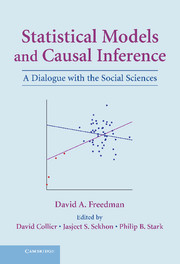Book contents
- Frontmatter
- Contents
- Preface
- Editors' Introduction: Inference and Shoe Leather
- Part I Statistical Modeling: Foundations and Limitations
- Part II Studies in Political Science, Public Policy, and Epidemiology
- Part III New Developments: Progress or Regress?
- Part IV Shoe Leather Revisited
- 20 On Types of Scientific Inquiry: The Role of Qualitative Reasoning
- References and Further Reading
- Index
20 - On Types of Scientific Inquiry: The Role of Qualitative Reasoning
Published online by Cambridge University Press: 05 June 2012
- Frontmatter
- Contents
- Preface
- Editors' Introduction: Inference and Shoe Leather
- Part I Statistical Modeling: Foundations and Limitations
- Part II Studies in Political Science, Public Policy, and Epidemiology
- Part III New Developments: Progress or Regress?
- Part IV Shoe Leather Revisited
- 20 On Types of Scientific Inquiry: The Role of Qualitative Reasoning
- References and Further Reading
- Index
Summary
Abstract. One type of scientific inquiry involves the analysis of large data sets, often using statistical models and formal tests of hypotheses. Large observational studies have, for example, led to important progress in health science. However, in fields ranging from epidemiology to political science, other types of scientific inquiry are also productive. Informal reasoning, qualitative insights, and the creation of novel data sets that require deep substantive knowledge and a great expenditure of effort and shoe leather have pivotal roles. Many breakthroughs came from recognizing anomalies and capitalizing on accidents, which require immersion in the subject. Progress means refuting old ideas if they are wrong, developing new ideas that are better, and testing both. Qualitative insights can play a key role in all three tasks. Combining the qualitative and the quantitative–and a healthy dose of skepticism–may provide the most secure results.
One type of scientific inquiry involves the analysis of large data sets, often using statistical models and formal tests of hypotheses. A moment's thought, however, shows that there must be other types of scientific inquiry. For instance, something has to be done to answer questions like the following. How should a study be designed? What sorts of data should be collected? What kind of a model is needed? Which hypotheses should be formulated in terms of the model and then tested against the data?
- Type
- Chapter
- Information
- Statistical Models and Causal InferenceA Dialogue with the Social Sciences, pp. 337 - 356Publisher: Cambridge University PressPrint publication year: 2009
- 3
- Cited by

